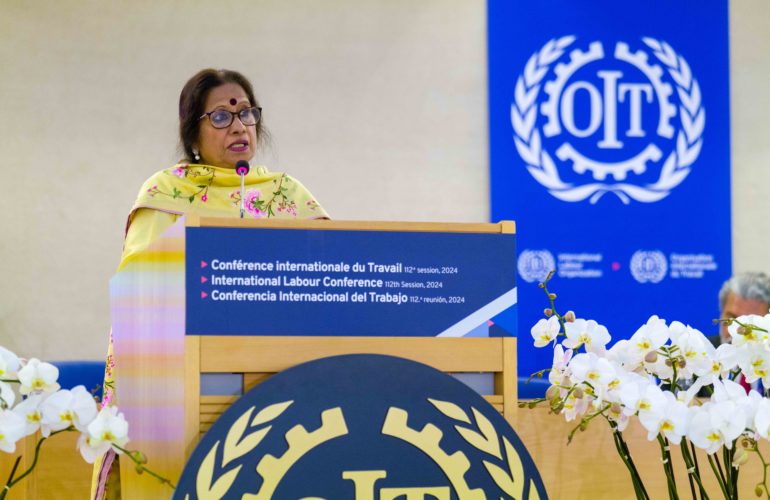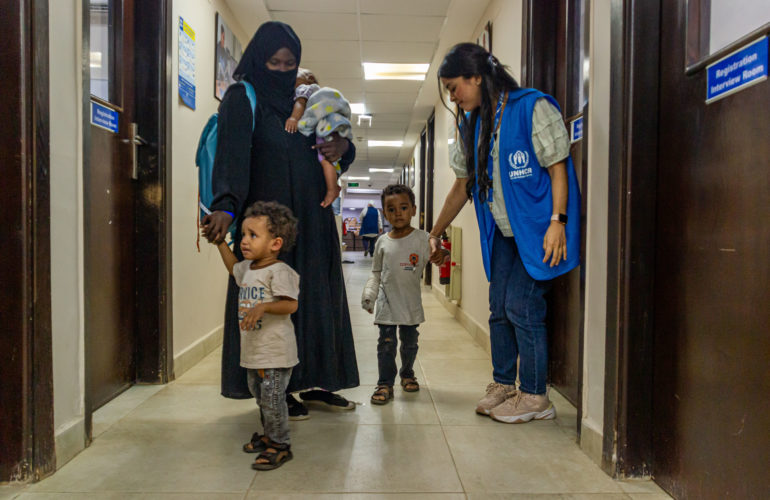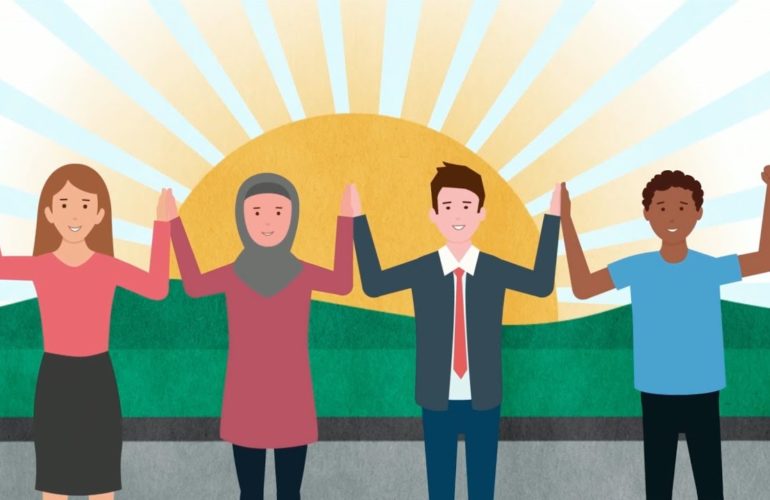Building on its long-standing experience protecting refugees, ICMC urges and encourages governments to implement refugee law standards, as well as migration mechanisms and policies that benefit States, refugees and the host communities welcoming them. In its advocacy, ICMC collaborates with partners such as other civil society organizations and international organizations to amplify common messages around improving the lives of refugees, especially the most vulnerable and in need of protection.
ICMC serves women, men and children refugees, focusing especially on the most vulnerable and at-risk populations, by providing humanitarian assistance on the ground and advocating before States for better policies and protection mechanisms.
ICMC urges governments to ensure that the way they treat refugees and those seeking asylum at their borders is protection-oriented and respects their human dignity and human rights. Because refugees themselves can speak authoritatively of their experience and challenges, ICMC promotes wider participation of refugees and host communities in the design of adequate solutions, especially regarding housing, education and livelihoods in their new country.
Advocating for more resettlement places, additional complementary admission pathways to protection, and robust integration programming in cities and towns are cornerstones of ICMC policy work, based on our over 50 years’ experience in refugee resettlement.

ICMC highlights specific concerns, such as the needs of the most vulnerable among the refugees, including, but not limited to, separated and unaccompanied children, women at risk, victims of human trafficking, and those unprotected or at risk of persecution in their first country of asylum. Another key concern is the prevention of family separation and enhanced child protection.
For Global Solutions Based on International Cooperation
For years, a majority of the world’s 25 million refugees have been hosted in just five countries who themselves have been facing economic challenges. Acknowledging that this was unsustainable and unfair, and that more countries needed to step forward and help out, the UN Secretary General brought the international community together to discuss and agree upon two documents that would respectively boost international solidarity and prescribe predictable and equitable responsibility-sharing arrangements for hosting and protecting refugees, and manage migration in a humane and responsible manner.
After two years of Geneva-based, intensive consultations and discussions, on 17 December 2018 an overwhelming majority of states adopted the Global Compact on Refugees at the United Nations General Assembly in New York. The Compact builds on the principles of the 1951 Convention Relating to the Status of Refugees and its accompanying 1967 Protocol, which set the standard for refugee protection. It aims to bolster international solidarity between a variety of actors – from States, private sector and host communities to NGOs and faith-based organizations – on how best to work together to share responsibility more fairly and respond to the needs of refugee-hosting countries and the refugees they welcome.
The four key objectives of the Compact on Refugees are:
- to ease the pressure on host countries who are often facing their own domestic challenges but who have welcomed the majority of refugees;
- to enhance refugee self-reliance by helping them with vocational training and livelihood options;
- to expand access to third-country solutions such as resettlement and complementary pathways;
- to support conditions in countries of origin for return in safety and dignity.
Throughout the two-year process leading up to the affirmation of the Global Compact on Refugees, ICMC actively advocated alongside UN Member States, UN agencies, the International Council of Voluntary Agencies, and other civil society partners in Geneva for a Compact that would put life-saving protection for refugees and international solidarity at its core. Ensuring that the Compact provided a viable framework whereby large refugee-hosting countries received the support they needed to continue their hospitality and that refugees had the support they needed to lead self-sufficient, productive lives in safety was essential.
ICMC – both in partnership as well as an individual organization – continues to advocate intensely for effective implementation of the Global Compact on Refugees, increased international solidarity and responsibility-sharing and for sustainable, life-saving refugee protection.
For More Refugee Resettlement and Complementary Admission Pathways
In 2019, over 1.4 million refugees were in need of resettlement but less than 65,000 actually departed to a third countries. To address this gap, the Global Compact on Refugees features the Three-Year Strategy on Resettlement and Complementary Pathways which defines a timeline and targets for offering protection solutions like resettlement to refugees. Complementary pathways are additional, regular admission pathways for refugees offering them temporary safety and a particular scope for rebuilding their lives in the host community.
At ICMC, we have seen how through resettlement, refugees are able to begin their life anew in safety and dignity, contributing constructively and giving back to the communities who welcome them, too. Advocating for increased resettlement places, an expanded base of resettlement countries, additional, complementary admission pathways, and effective integration programming is a focus of ICMC’s policy.

Speaking up at high-level international meetings, before institutions such as the European Commission and via organizing and participating in informal dialogues with States and other NGO partners, ICMC urges States to use these mechanisms to offer life-saving protection to refugees, especially those most in need such as at-risk women, unaccompanied and separated children and victims of trafficking. With its over 50 years’ experience helping resettle refugees, ICMC demonstrates how resettlement can and does benefit both refugee children, men and women as well as the communities hosting them.
Complementary admission pathways are regular, safe and orderly avenues of entry which are always additional to resettlement places; they provide the refugee and her or his family with a particular scope that fosters refugee integration. Examples of complementary pathways include labor, education and family reunification channels, community-based or private sponsorship programs, including the faith-based humanitarian corridors program propelled in partnership with a number of faith-based organizations and governments.
ICMC liaises with actors who foster and facilitate these innovative admission pathways, such as the humanitarian corridors project in Italy, and brings these experiences to the attention of governments via, for example, statements, at high-level meetings and in informal dialogues.
At the first Global Refugee Forum that took place in December 2019 in Geneva – an event aimed at kick-starting the implementation of the Global Compact on Refugees – ICMC pledged its concrete and active support to the Compact, specifically the Three-Year Strategy on Resettlement and Complementary Pathways. Building on its UNHCR-ICMC Deployment Scheme, ICMC pledged to enhance the UN Refugee Agency (UNHCR)’s field capacity by deploying experts in resettlement and complementary pathways, child protection and sexual and gender-based violence.
ICMC Europe also advocates before European Union Member States to increase resettlement and complementary admission pathways and for robust integration programming through its SHARE Network, an alliance of local, national, and regional governments, international organizations, civil society organizations, volunteers, and academics. Together they work at all stages of the resettlement process: selection and identification, pre-departure assistance and orientation, travel, reception, and integration in the country of destination.
Enhancing Protection in Times of Crisis
In April 2020, ICMC joined civil society organizations from across the world to call on world governments to ensure that refugees are protected even, and especially, in times of the COVID-19 pandemic. The oftentimes precarious situations in which refugees are forced to live make them particularly vulnerable. Basic hygiene measures, such as washing hands with soap and keeping distance, may not be possible in crowded and unsanitary refugee camps.
The decongestion of camps and camps-like settings – as well as the release of people held in immigration detention centres – is indeed one of the main demands put forward by ICMC and partner organizations.
ICMC Europe and 67 civil society organizations also urged governments to urgently relocate around 1,800 unaccompanied minors present on the Greek islands in March 2020. Especially in light of the deteriorating health situation, ICMC Europe strongly advocates for a solution for the particularly vulnerable population. ICMC was encouraged by the efforts of some European countries who, starting in April 2020, have begun relocating and offering protection to a number of unaccompanied minors from some of the Greek Islands.



